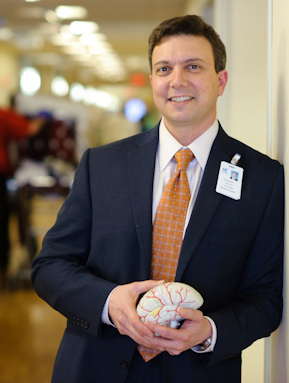 Dr. Levine comes to Holy Cross Hospital as the new medical director of neurosurgery, where he combines advanced neurosurgical procedures with the highest regard to patient safety and extensive communication. We sat down with Dr. Levine to learn more about him and the skills he brings to Holy Cross Hospital.
Dr. Levine comes to Holy Cross Hospital as the new medical director of neurosurgery, where he combines advanced neurosurgical procedures with the highest regard to patient safety and extensive communication. We sat down with Dr. Levine to learn more about him and the skills he brings to Holy Cross Hospital.
Why did you become a neurosurgeon?
For as long as I can remember, I have been fascinated with the brain. My mother was a scientist and my father is a physician, so I grew up surrounded by science and medicine.
Tell us about Holy Cross Hospital’s neuroscience program.
Our patients expect and deserve a well-managed, team-based, clearly communicated approach that offers the best possible treatment options for each individual. The neuroscience team at Holy Cross Hospital brings together experts and the latest technology to provide comprehensive brain and spine care.
What is one of the latest developments in neurosurgery?
Deep brain stimulation uses a surgically implanted medical device to deliver controlled electrical stimulation to targeted areas in the brain. The electrical impulses block the abnormal nerve signals that cause tremor, rigidity and stiffness that affect many patients with Parkinson’s disease. This is one of the most rewarding surgeries I perform. It is liberating for patients with movement disorders. They regain control over their bodies.
What other types of surgery does a neurosurgeon perform?
A neurosurgeon is not just a “brain surgeon.” I perform spinal surgeries, including endoscopic and microscopic disk surgery and spinal instrumentation for trauma and degenerative disease.
